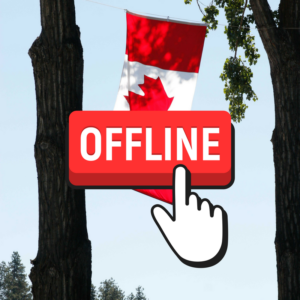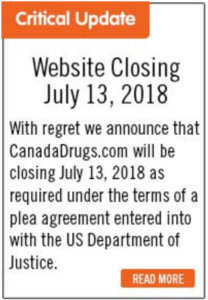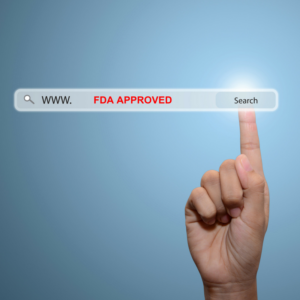by Gabriel Levitt, President, PharmacyChecker.com and Prescription Justice | Jul 19, 2018 | FDA enforcement
 The online pharmacy, CanadaDrugCenter.com, which had been verified by PharmacyChecker, is no longer accessible over the Internet. At the end of June, the managers of the online pharmacy—and others owned by them, CanadaDrugPharmacy.com and CanadaDrugStop.com—informed PharmacyChecker that they were withdrawing from the PharmacyChecker Verification Program because they were going offline, but they did not tell us why.
The online pharmacy, CanadaDrugCenter.com, which had been verified by PharmacyChecker, is no longer accessible over the Internet. At the end of June, the managers of the online pharmacy—and others owned by them, CanadaDrugPharmacy.com and CanadaDrugStop.com—informed PharmacyChecker that they were withdrawing from the PharmacyChecker Verification Program because they were going offline, but they did not tell us why.
We still don’t know why, either, but I suspect it has to do with the U.S. government’s case against its owners dating back to 2007-2011.
(more…)
Tagged with: canadadrugcenter, canadadrugs, Enforcement
by Gabriel Levitt, President, PharmacyChecker.com and Prescription Justice | Jul 13, 2018 | FDA enforcement
 [UPDATE: Today (July 13th, 2018), CandaDrugs.com, and other sites it owns, such as JanDrugs.com, have stopped selling medicines to patients in the U.S. in accordance with an agreement with the U.S. Attorney in Montana. Below, please read to understand why this happened. Several stories in the media are reporting that the reason is that patients bought counterfeit drugs from the online pharmacy, which is not true.
[UPDATE: Today (July 13th, 2018), CandaDrugs.com, and other sites it owns, such as JanDrugs.com, have stopped selling medicines to patients in the U.S. in accordance with an agreement with the U.S. Attorney in Montana. Below, please read to understand why this happened. Several stories in the media are reporting that the reason is that patients bought counterfeit drugs from the online pharmacy, which is not true.
Bottom line, as I see it: a very well-run, safe, international online pharmacy was forced by the U.S. government to stop helping Americans afford prescription drugs because the pharmaceutical industry wanted that outcome.
It’s a shame and American patients struggling with prescription costs are worse off for it.]
[FIRST PUBLISHED APRIL 13, 2018]
In a plea bargain signed today with the U.S. Department of Justice, the owners of CanadaDrugs.com are forfeiting their website www.CanadaDrugs.com and other websites they operate to the U.S. government. This is an unfortunate outcome of a case that did not involve medication sales of the popular website CanadaDrugs.com, which has been safely selling medication at low cost to Americans for many years. The case involved a separate wholesale business conducted by the owners of the website. Sadly, two counterfeit batches of the cancer medication, Avastin, entered the supply chain of that wholesale business in 2011 and were sold to medical offices in the U.S. To be clear, Avastin was never sold on the CanadaDrugs.com website.
For some balance and context: in the past, CVS and CVS.com were found to be selling counterfeit Lipitor, yet this did not lead to CVS having to forfeit its website to the U.S. government.
CanadaDrugs.com had been a verified member of the PharmacyChecker Verification Program since 2005. During that time, it likely processed millions of prescriptions and filled them from licensed pharmacies in Australia, Canada, New Zealand and the United Kingdom. We have verified the licenses of these pharmacies. CanadaDrugs.com voluntarily withdrew from our program in March, aware of the pending deal with the U.S. government. The FDA recognizes that there is no urgency to shutting down CanadaDrugs.com, giving them 90 days to wind down their international retail pharmacy business. In fact, CanadaDrugs.com remains a licensed pharmacy in Manitoba, Canada.
It was necessary for the FDA to investigate and act to prevent medication from being illegally sold at a wholesale level into the U.S. The enforcement discretion used by the FDA for personal importation never extended to those who illegally import and resell medication. We at PharmacyChecker have never condoned such sales. However, the deal struck is likely to do more harm than good by shuttering a good online pharmacy that was operating safely. Making matters worse, this case has been and continues to be used by the pharmaceutical industry to fuel a campaign carried out by its front groups to scare Americans and stop them from buying lower cost, safe and effective medications from pharmacies in other countries.
Interestingly, just as the indictment in this case was slated for release in February of 2015, I sent a report to the members of congress most responsible for regulating the FDA called: “Online Pharmacies, Personal Drug Importation, and Public Health: Ill-Considered Enforcement Prevents Access to Safe and Affordable Medication.” Basically, it was my attempt to explain, with rigorous analysis and research, why shutting down the safest international online pharmacies is bad for public health. It was bad policy then and it remains so now with tens of millions of Americans not filling prescriptions each year because of cost.
Tagged with: avastin, canadadrugs, Enforcement
by Gabriel Levitt, President, PharmacyChecker.com and Prescription Justice | Jul 6, 2018 | FDA enforcement
 Last week, I published an article about new cooperation between Internet companies and the FDA undertaken to supposedly stamp out illegal opioid sales on the Internet, yet slides consciously into stopping imports of safe, lower-cost medicines. The article talked about the FDA’s Online Opioid Summit, which was held last Wednesday.
Last week, I published an article about new cooperation between Internet companies and the FDA undertaken to supposedly stamp out illegal opioid sales on the Internet, yet slides consciously into stopping imports of safe, lower-cost medicines. The article talked about the FDA’s Online Opioid Summit, which was held last Wednesday.
That summit was covered effectively (as much as possible) in this article from Tarbell to uncover further proof that the agency is, in fact, targeting online sales of regular, lower-cost medicines, which are imported for personal use. Reporter Michael McAuliff noted that the so-called public summit was mostly closed-door and very secretive. Reporters were not invited. Pharma, however, was well represented.
Apparently, it was the Internet companies who wanted privacy, perhaps to conceal efforts at stopping opioid sales on their platforms to not tip off the drug dealers. It could also be that they are ashamed of bowing to demands to censor content that Big Pharma/the FDA finds objectionable. Time will tell.
To his credit, Mr. McAuliff asks how big of a contributor to illegal opioid sales the Internet actually is. According to a division of the Centers for Disease Control and Prevention, only one tenth of one percent (0.1%) of illegally obtained prescription narcotics (opioids) are purchased online.
According to staff at the Internet Association, a trade group that represents about 40 large Internet firms, including Microsoft, Google, Amazon, Facebook, and Go Daddy, 3.4% of people abusing opioids obtain them from online sources. I have yet to find the survey, but will try to do so and write about it soon.
So how do we know that actions taken by the FDA to curtail illegal opioid sales online are being used against safe personal drug importation as well? The best example is the increased numbers of prescription orders being seized by the FDA using funding by Congress that was appropriated for stopping illegal opioid imports, particularly the drug Fentanyl and its analogs. As Tarbell finds, most such seizures are not opioids but regular prescription medicines.
The Tarbell article quotes FDA Commissioner Scott Gottlieb owning up to this:
“We’ll use [the increased funding from Congress] to interdict more illegal products flowing across our borders, including products ordered online, as well as shifting more of our criminal investigative resources to target these online sales. This is a conscious policy decision by the FDA, and we believe these online sales represent one of the highest areas of risk facing Americans right now.”
Tens of thousands of deaths occur each year from opioid overdose. A small fraction of those drugs were purchased online and those sales must be stopped! However, the tragedy of opioid abuse should not be used like this to stop people from getting more affordable medicines from Canada and other countries.
Tagged with: Enforcement, opioids
 The online pharmacy, CanadaDrugCenter.com, which had been verified by PharmacyChecker, is no longer accessible over the Internet. At the end of June, the managers of the online pharmacy—and others owned by them, CanadaDrugPharmacy.com and CanadaDrugStop.com—informed PharmacyChecker that they were withdrawing from the PharmacyChecker Verification Program because they were going offline, but they did not tell us why.
The online pharmacy, CanadaDrugCenter.com, which had been verified by PharmacyChecker, is no longer accessible over the Internet. At the end of June, the managers of the online pharmacy—and others owned by them, CanadaDrugPharmacy.com and CanadaDrugStop.com—informed PharmacyChecker that they were withdrawing from the PharmacyChecker Verification Program because they were going offline, but they did not tell us why.


 Last week, I published an article about
Last week, I published an article about 